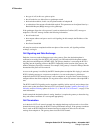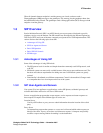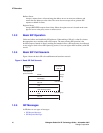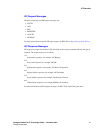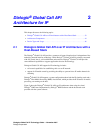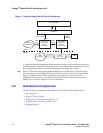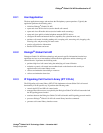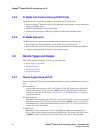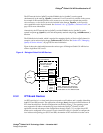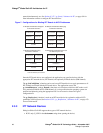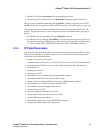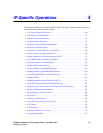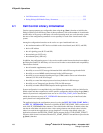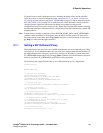46 Dialogic
®
Global Call IP Technology Guide — November 2007
Dialogic Corporation
Dialogic
®
Global Call API Architecture for IP
2.2.4 IP Media Call Control Library (IPM CCLib)
The IP Media Call Control Library (IPM CCLib) performs the following tasks:
• processes Dialogic
®
Global Call API CCLib commands for the opening, closing, and timeslot
routing of IP media devices
• configures QoS (Quality of Service) thresholds
• translates QoS alarm events to Dialogic
®
Global Call API alarm (GCAMS) events
2.2.5 IP Media Resource
The IP Media Resource processes the IP Media stream. It performs the following tasks:
• encodes PCM data from the TDM bus into IP packets sent to the IP network
• decodes IP packets received from the IP network into PCM data transmitted to the TDM bus
• configures and reports QoS information to the IP Media stream
2.3 Device Types and Usage
This section includes information about device types and usage:
• Device Types Used with IP
• IPT Board Devices
• IPT Network Devices
• IPT Start Parameters
2.3.1 Device Types Used with IP
When using Dialogic
®
Global Call API with IP technology, a number of different device types are
used:
IPT Board Device
A virtual entity that represents a NIC or NIC address (if one NIC supports more than one IP
address). The format of the device name is iptBx, where x is the logical board number that
corresponds to the NIC or NIC address. See Section 2.3.2, “IPT Board Devices”, on page 47
for more information.
IPT Network Device
Represents a logical channel over which calls can be made. This device is used for call control
(call setup and tear down). The format of the device name is iptBxTy, where x is the logical
board number and y is the logical channel number. See Section 2.3.3, “IPT Network Devices”,
on page 48 for more information.
IP Media Device
Represents a media resource that is used to control RTP streaming, monitoring Quality of
Service (QoS) and the sending and receiving of DTMF digits. The format of the device name
is ipmBxCy, where x is the logical board number and y is the logical channel number.



